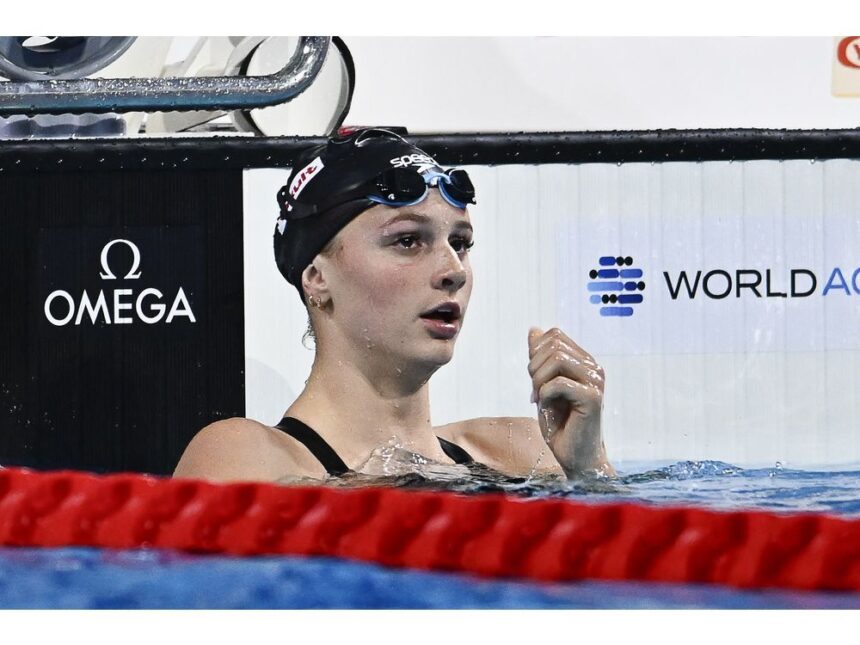The water had barely settled from her first triumph when Summer McIntosh did it again. In a span of just three days, the 17-year-old Canadian swimming phenom shattered not one, but two world records at the Canadian Olympic swimming trials in Toronto, sending shockwaves through the swimming world and cementing her status as a generational talent.
I was poolside for both historic swims, watching as McIntosh first demolished the women’s 400-meter individual medley record on Tuesday with a time of 4:24.38, slicing nearly half a second off the previous mark set by Hungary’s Katinka Hosszu at the 2016 Rio Olympics.
“I definitely wasn’t expecting that,” McIntosh told reporters afterward, her voice still carrying the breathless excitement of the moment. “I just wanted to get my hand on the wall first and qualify for the Olympics.”
But the Toronto native wasn’t finished rewriting the record books. On Thursday evening, with the home crowd at the Toronto Pan Am Sports Centre creating a thunderous atmosphere, McIntosh clocked 2:03.65 in the 200-meter butterfly, erasing the 2:03.71 mark set by China’s Zhang Yufei and etching her name in swimming history once again.
These performances weren’t just fast—they were masterclasses in technical swimming. In the 400 IM, McIntosh’s butterfly leg established an early advantage, but it was her devastating backstroke that created the separation needed to challenge the world record. By the time she turned to freestyle, the only question was by how much she would break the record.
Swimming Canada’s high-performance director John Atkinson couldn’t contain his admiration: “What we’re witnessing is extraordinary. Summer isn’t just winning races; she’s redefining what’s possible in these events.”
The significance of McIntosh’s achievement extends beyond the records themselves. At just 17, she now holds three world records, having previously set the 400-meter freestyle mark in March 2023. According to Swimming Canada statistics, she’s the youngest swimmer to hold multiple world records since American swimming legend Katie Ledecky’s emergence over a decade ago.
Perhaps most remarkable is McIntosh’s versatility. The 400 IM requires mastery of all four swimming strokes, while the 200 butterfly demands perfect technique and pacing. Few swimmers in history have dominated such different disciplines simultaneously.
“It’s not just that she’s breaking records,” explained Olympic gold medalist Mark Tewksbury, who was commentating the trials. “It’s that she’s breaking them in events that require completely different skill sets. That’s what makes her special.”
McIntosh’s rise hasn’t been overnight. Born into a swimming family—her mother Jill Horstead represented Canada at the 1984 Olympics—Summer first made headlines when she qualified for the Tokyo Olympics at just 14 years old, the youngest Canadian Olympian in decades.
Since then, her trajectory has been meteoric. Working with coaches Ryan Mallette and Brad Dingey at the High Performance Centre-Ontario, McIntosh has transformed from promising talent to the athlete other swimmers fear most.
“Her training ethic is unlike anything I’ve seen,” Mallette told me in a previous interview. “Some days I have to tell her to do less, not more.”
The timing of these world records couldn’t be more significant. With the Paris Olympics less than three months away, McIntosh has announced herself as not just a medal contender, but the swimmer to beat in multiple events.
The Canadian Olympic Committee is understandably thrilled. After winning six swimming medals at Tokyo 2021—including McIntosh’s fourth-place finish in the 400 freestyle—expectations for Paris are soaring.
“Summer represents everything that’s exciting about Canadian swimming right now,” said COC President Tricia Smith. “These performances suggest we’re entering a golden era for our swimmers on the international stage.”
According to Swimming Canada data, Canadian trials have seen eight swimmers achieve Olympic qualifying standards through the first three days of competition, indicating the broader strength of the program.
For McIntosh personally, the records bring both validation and pressure. She’ll arrive in Paris carrying expectations that few 17-year-olds have ever shouldered.
“I’m just trying to focus on the process,” McIntosh said when I asked about Olympic expectations. “These records are amazing, but they don’t guarantee anything in Paris.”
The swimming world has taken notice. American swimming legend Michael Phelps, holder of 23 Olympic gold medals, praised McIntosh’s technique on social media, calling her butterfly stroke “poetry in motion.”
Current competitors are adjusting their expectations too. American Katie Ledecky, considered the greatest female distance swimmer in history, will face McIntosh in the 400 freestyle in what could be one of the Olympics’ most anticipated showdowns.
Sport Canada’s latest athlete development report identifies McIntosh as the cornerstone of a women’s program that could challenge the Americans and Australians for swimming supremacy this Olympic cycle.
Back home in Canada, McIntosh’s achievements have transcended sports pages. The Globe and Mail featured her on Thursday’s front page, while CBC devoted extensive coverage to both record-breaking swims.
Her impact extends beyond media attention. Swimming Canada reports a 12% increase in youth swimming registrations since Tokyo, with officials attributing much of this growth to the “McIntosh effect.”
As the trials continue through Sunday, McIntosh still has opportunities in the 200 IM and 200 freestyle. While no one is expecting more world records, it would be foolish to rule out further history from a swimmer who seems determined to redefine possibility.
For now, though, the swimming world pauses to acknowledge what we’re witnessing: the emergence of a once-in-a-generation talent who, at just 17, is already rewriting swimming’s record books. Paris awaits, and with it, the global stage that Summer McIntosh now seems destined to dominate.






